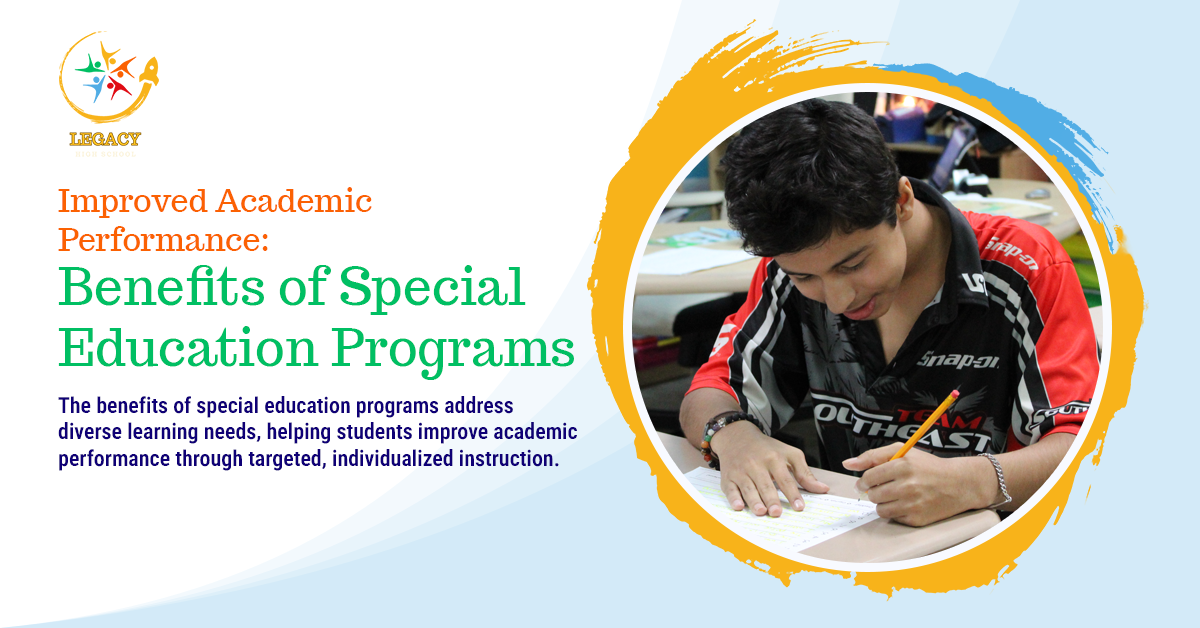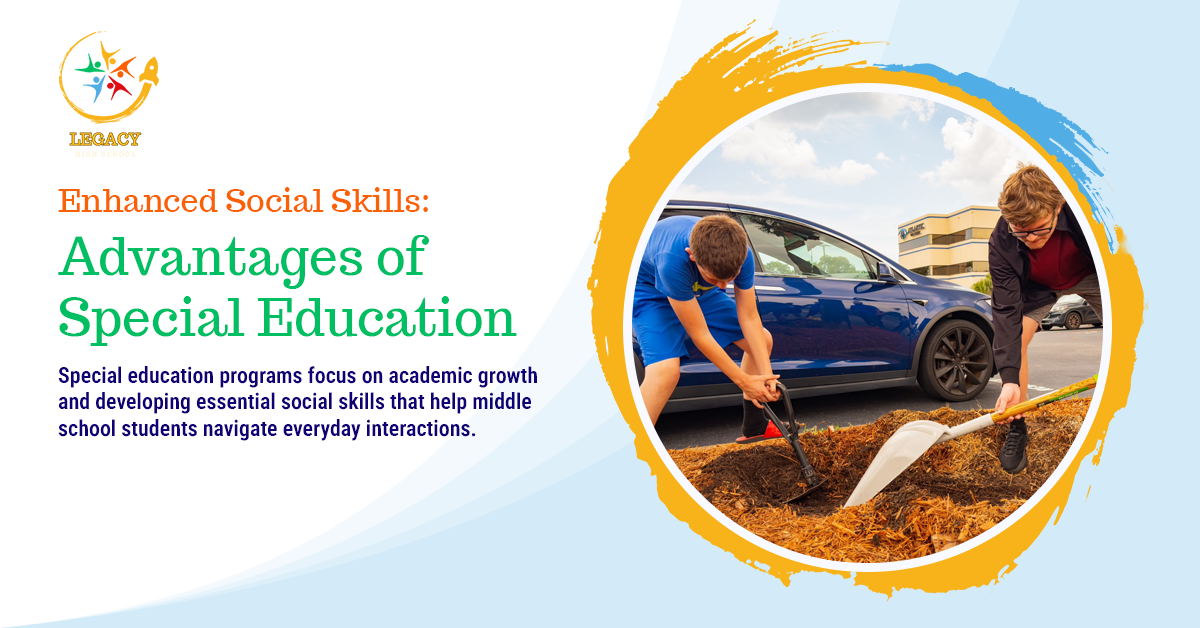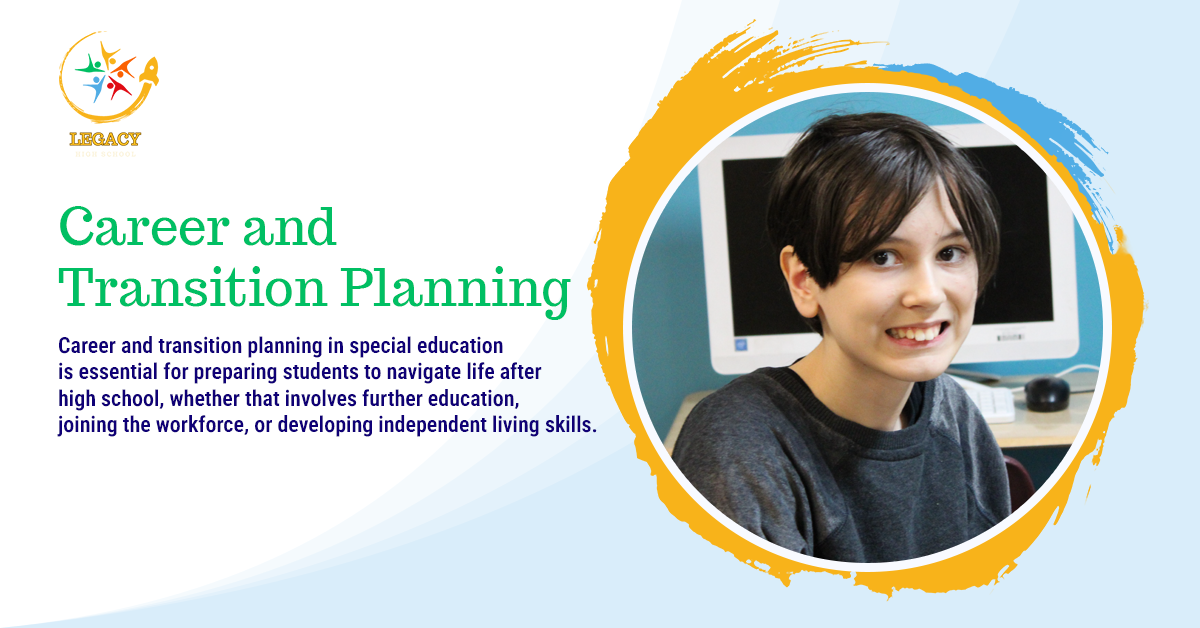The benefits of special education extend far beyond academic growth. They provide middle school students unique opportunities to thrive in a supportive environment. Special education helps students build critical life skills, boost self-confidence, and foster independence by implementing individualized teaching strategies, specialized resources, and a nurturing atmosphere.
Our programs empower each child, helping them navigate academic and social hurdles while celebrating their achievements. We will explore the top 10 special education benefits for middle school students, highlighting how these tailored services set the foundation for long-term success and personal development.
Personalized Learning Plans: Special Education Benefits
Through Individualized Education Programs (IEPs), educators and specialists can design structured, adaptable plans that set realistic goals and create a clear path for students to achieve their full potential. These plans are developed collaboratively, incorporating insights from teachers, parents, specialists, and students. Typical components of an IEP include:
- Academic Goals: Customized objectives based on the student’s current abilities and areas for improvement.
- Behavioral Strategies: Techniques to help the student manage behaviors, build social skills, and develop self-regulation.
- Support Services: Access to extra resources such as speech therapy, occupational therapy, or counseling as needed.
IEPs are reviewed and adjusted regularly, reflecting the student’s progress and evolving needs. This continuous assessment helps maintain an environment where students feel supported and encouraged to take on new challenges, fostering academic growth and personal development.
Improved Academic Performance: Benefits of Special Education Programs

The benefits of special education programs address diverse learning needs, helping students improve academic performance through targeted, individualized instruction. There are several ways that special education enhances academic outcomes:
- Customized Teaching Strategies: Lessons are adapted to match each student’s learning style, using techniques such as visual aids, hands-on activities, or technology-assisted instruction. This approach allows students to process and retain information more effectively.
- Targeted Interventions: Frequent assessments and progress monitoring enable educators to identify areas where students struggle and implement targeted interventions, ensuring no one falls behind.
- Smaller Class Sizes: With a reduced student-to-teacher ratio, teachers can provide more one-on-one guidance, ensuring every student receives the attention and feedback they need to succeed.
These strategies foster a deeper understanding of academic content, enhance critical thinking skills, and build a strong foundation for future academic success.
Enhanced Social Skills: Advantages of Special Education
Special education programs focus on academic growth and developing essential social skills that help middle school students navigate everyday interactions. Find the finest advantages of special education below:
- Social Skills Training: Students engage in structured activities that teach communication, conflict resolution, and teamwork. Role-playing exercises, group projects, and social stories are often used to practice appropriate responses in different scenarios.
- Peer Interaction Opportunities: Through small group settings and peer mentoring, students have more chances to engage with classmates, practice conversational skills, and develop empathy.
- Inclusive Classroom Environment: Special education’s inclusive nature fosters a supportive atmosphere where students feel safe expressing themselves, sharing ideas, and interacting.
These skills lay a solid foundation for positive interactions and long-term success in various social environments.
Supportive Learning Environment
A supportive learning environment is a cornerstone of special education, creating a space where middle school students can feel safe, understood, and encouraged to explore their potential. Here’s how a supportive learning environment is established:
- Smaller Class Sizes: With fewer peers per class, teachers can dedicate more time and attention to each child, fostering stronger connections and more effective guidance.
- Qualified Staff and Resources: Teachers and support staff in unique education settings are trained to understand diverse learning needs and implement strategies that promote academic and social success. This might include specialized training in behavioral management, de-escalation techniques, and differentiated instruction.
- Positive Reinforcement: Celebrating small victories, acknowledging effort, and providing constructive feedback contribute to a positive atmosphere that motivates students to progress.
This supportive environment helps students build confidence, develop resilience, and fosters a love for learning that reaches beyond the classroom, setting the stage for lifelong personal and academic growth.
Boosted Self-Esteem and Confidence
One of the most significant benefits of special education is its ability to build self-esteem and confidence in middle school students. Here’s how special education helps boost self-esteem and confidence:
- Personalized Achievement Milestones: Customized learning plans enable students to set realistic goals and oversee their progress. As they reach each milestone, their sense of accomplishment grows, reinforcing the idea that they can succeed.
- Safe Space for Growth: A supportive and understanding environment allows students to express themselves, take risks, and learn from their flaws without fear of judgment. This helps them become more resilient and willing to try new things.
- Opportunities for Leadership and Peer Mentoring: Being involved in activities that showcase their skills or help peers in need can further increase students’ self-worth and confidence.
Special education nurtures a growth mindset, helping students develop a greater belief in their capabilities and inspiring them to pursue academic and personal goals.
Development of Life Skills
Special education programs strongly emphasize teaching essential life skills beyond academics, preparing students for greater independence and success in everyday situations. Here’s how special education supports life skill development:
- Self-Management and Organization: Students learn techniques for organizing their daily tasks, managing time effectively, and setting personal goals. These skills foster independence and help students become more self-reliant.
- Social and Communication Skills: Through structured activities, students practice initiating conversations, expressing emotions appropriately, and resolving conflicts, enhancing their ability to interact effectively in various social settings.
- Independent Living Skills: Students are taught practical skills such as budgeting, cooking, personal hygiene, and navigating public transportation. These lessons empower them to handle day-to-day responsibilities with confidence.
By focusing on these areas, special education provides students with a well-rounded foundation that equips them for real-world challenges, helping them become more independent and successful as they move into adulthood.
Behavioral and Emotional Support
Behavioral and emotional support is a critical component of special education, designed to help middle school students develop healthy coping strategies, emotional regulation, and positive behavior patterns. Here’s how special education programs provide behavioral and emotional support:
- Behavioral Interventions and Plans: Individualized Behavioral Intervention Plans (BIPs) are developed to address specific behavioral challenges. These plans include positive reinforcement, clear expectations, and structured routines that help students understand and manage their behavior.
- Counseling and Therapy Services: Many special education programs include access to school counselors or therapists who provide one-on-one or group counseling sessions. These sessions can address issues like anxiety, stress management, and social skills development.
- Safe Space for Emotional Expression: Students are encouraged to express their feelings in a supportive, judgment-free environment. This helps them become more self-aware and equips them with healthy strategies for dealing with emotions.
With comprehensive behavioral and emotional support, students can handle the challenges of middle school, resulting in increased academic performance and a more beneficial school experience overall.
Career and Transition Planning
Career and transition planning in special education is essential for preparing students to navigate life after high school, whether that involves further education, joining the workforce, or developing independent living skills. Here’s how special education programs support career and transition planning:
- Career Exploration: Students participate in activities and assessments that help identify their interests, strengths, and potential career paths. They may also have opportunities to learn about different industries, job roles, and vocational skills through guest speakers, career days, or industry visits.
- Transition Services: These services focus on helping students and their families create a transition plan that includes steps for post-secondary education, employment, and independent living. The plan is updated regularly to align with the student’s evolving goals and abilities.
- Life Skills and Vocational Training: Special education programs often include vocational courses, independent living skills training, and job readiness workshops to ensure students are prepared for life beyond school.
By integrating career and transition planning into the curriculum, special education programs empower students to envision and work toward a successful future, equipped with the knowledge and confidence needed to reach their goals.
Parental Involvement and Support
Parental involvement and support play a crucial role in the success of special education programs, bridging the gap between school and home to create a consistent and nurturing learning environment. Here’s how special education promotes parental involvement and support:
- Regular Communication: Special education programs often include frequent updates, progress reports, and parent-teacher meetings. This consistent communication ensures parents know their child’s achievements and areas needing additional attention.
- Parent Training and Workshops: Schools may offer training sessions and workshops to help parents better understand their child’s unique needs and the strategies being used in the classroom. This empowers parents to reinforce learning at home and provide more effective support.
- Resource Sharing: Schools often provide parents with resources, such as counseling services, community programs, or support groups, to help them manage the emotional and practical aspects of supporting a child with special needs.
By fostering strong partnerships with parents, special education programs create a collaborative support system that empowers students to achieve their full potential inside and outside the classroom.
Access to Advanced Learning Tools and Resources
Special education programs provide students access to various advanced learning tools and resources that support individualized learning and enhance overall educational experiences. Essential resources and tools include:
- Assistive Technology: Devices such as text-to-speech software, audiobooks, and communication boards help students overcome learning barriers, making accessing and understanding complex materials easier. These tools especially benefit students with visual, auditory, or motor challenges.
- Adaptive Learning Platforms: Digital platforms that adjust the difficulty and pacing of lessons based on a student’s performance provide a more personalized learning experience. These programs can target specific skills, offer interactive exercises, and track real-time progress.
- Therapeutic Resources: Tools such as sensory objects, fidget toys, and calming spaces are available to help students self-regulate and maintain focus during lessons.
By integrating these advanced learning tools and resources, special education programs ensure that students receive the support they need to succeed academically, socially, and emotionally, creating a more inclusive and practical educational experience.
Conclusion
Special education offers middle school students a transformative opportunity to thrive academically, socially, and emotionally. By focusing on personalized learning, enhanced social skills, emotional support, and practical life skills, these programs empower students to overcome obstacles and discover their full potential. The individualized approach helps build confidence, foster independence and set a strong foundation for future success.
If you want to learn more about how special education can benefit your child, visit Legacy High School or call 321-345-0861 to speak with our admissions team today!



